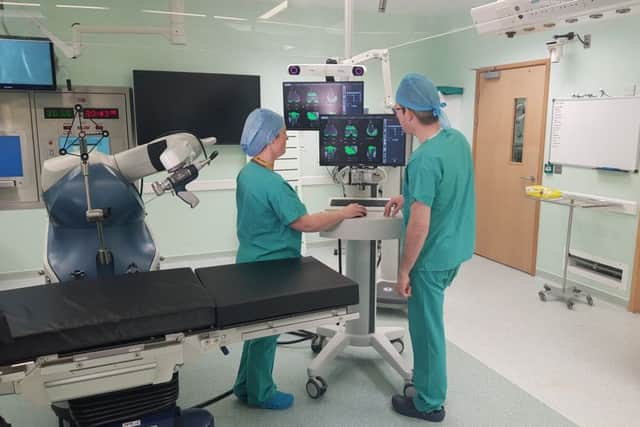NHS hospital becomes first in Scotland to use robot for knee replacement surgery
The Golden Jubilee in Clydebank which currently carries out over 25 per cent of all Scottish hip and knee replacements and is one of Europe’s largest elective orthopaedic centres, anticipates that approximately 300 patients will benefit from the robotic procedure in the first year.
Compared to non-robotic surgery, NHS Golden Jubilee patients across Scotland will benefit from greater implant accuracy, reduced soft tissue damage and blood loss.
Advertisement
Hide AdAdvertisement
Hide AdThe cutting edge procedure is less invasive – resulting in reduced pain, shorter length of stay and an earlier return to normal activity.


Caroline Ramsay, from Threemiletown, West Lothian, was the first Scottish patient to be treated by the Mako robot.
Nick Ohly is a consultant orthopaedic surgeon at NHS Golden Jubilee and the first in his specialism to treat patients using the Mako robot.
He said: “It is extremely exciting to be the first NHS hospital in Scotland to be able to offer robotic arm assisted partial and total knee replacements to NHS patients as part of routine care.
“The Mako robot is unique in orthopaedics in allowing the surgeon to implant every joint replacement in the optimal position for each individual patient based on their specific anatomy, while minimising bone resection and soft tissue injury.
“This allows for reduced pain after surgery, optimised function and quicker recovery.”
The Mako robot builds a virtual 3D model of each patient’s anatomy based on a pre-operative CT scan, which is then validated by live intra-operative measurements. The surgeon is then able to fine-tune the position of each component to work best for each patient.
The robotic arm is then used to make precise bony cuts according to the surgical plan, which conserves bone and minimises soft tissue damage.
Advertisement
Hide AdAdvertisement
Hide AdInitially concentrating on knee replacements, the plan is the robot will be used for hip replacements in future.
Mark MacGregor, NHS Golden Jubilee’s medical director, added: “There is already some evidence the longer term outcomes may be superior with robotic-arm assisted surgery. The introduction of robotics, combined with the expertise in clinical research means NHS Golden Jubilee should be well placed to lead on future research.”